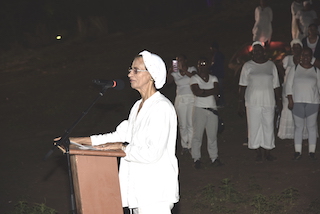
COLE BAY, Sint Maarten – On Monday, July 1st, Emancipation Day was celebrated on St. Maarten. As part of the celebrations and in observation of the day, the Department of Culture host an activity entitled “64,000 we have a Name”.
This was done in tribute to the 64,000 enslaved men, women, and children that were liberated from slavery within the Dutch Kingdom on July 1st, 1863. During the event, which was held on the grounds of the former Diamond Estate in Cole Bay, several persons took part in a re-enactment of the run for freedom.
During the event, persons at the location had the opportunity to also reflect on the many difficulties that our ancestors had to endure as slaves. The names of many of the enslaved persons were also called, as the organizers paid homage to our forefathers.
On hand for the occasion were among others, the Governor of St. Maarten, His Excellency drs. Eugene B Holiday, the Prime Minister, the Honorable Leona Romeo-Marlin, the Chairlady of Parliament, the Honorable Sarah Wescot-Williams, the Minister of ECYS, the Honorable Wycliffe Smith as well as government officials on the French side.
“This year our Emancipation celebration pays tribute to the 64 000 enslaved men, women, and children that were liberated from slavery within the Dutch Kingdom on July 1st 1863. While we pay tribute to those that were alive, we must also remember the thousands of unknown individuals that died years before. Their pain, blood, sweat, and tears that either were shed on the shores of the African continent, Atlantic Ocean, Caribbean seas or scattered throughout the many plantations of this hemisphere. On the eve of Emancipation Day, we simply cannot forget. “64000 we have a name”, this is a great theme as we reflect on the journey that has brought us here in our history on Sint Maarten,” Prime Minister Leona Romeo-Marlin said.
“In preparing for this address this evening, I reflected on my tenure as the Head of the Civil Registry Department and the privilege I had to view and work with the historical archives and records of Government. The Civil Registry to this day has in its possession the preserved records documenting the registration of the first enslaved persons on Sint Maarten, which by no coincidence began in 1863,” she inserted, adding that allow me to share with you the name of the first free person registered at the Civil Registry. Titus Arrundel, 71 years born to Diane Raun and the first female registered is Pamelia Arrundel, 41 years born to Mary Arrundel. Take note of the pronunciation Arrundel, while the registry also has Arrindell, Arndell and we all know Arnell, which is another variation more frequent on the French side.
Meanwhile, the Governor of St. Maarten, His Excellency drs. Eugene B Holiday noted that Emancipation is one of the most significant events in Sint Maarten’s history. Emancipation marked the triumph of the indomitable will of the enslaved men and women of Sint Maarten to be free. A triumph, which redefined our collective destiny as a Sint Maarten people!
“Emancipation had a profound impact on perceptions, notions, and traditions and helped to reshape the social, economic, political and cultural order of Sint Maarten. We the people of Sint Maarten, the sons and daughters of former slaves and slave-owners, have since realized major achievements, made possible by our collective efforts.”
He further remarked: “In doing so we created our Sint Maarten Culture. When we speak about culture, we are in fact speaking about identity. In speaking about identity, we are speaking about who we are as individuals and as a people. In speaking about identity, the best place to start is with our individual names. Our name is our identity, it is a window to our culture and to who we are as individuals and as a people. Our name connects us to our past and our past teaches us lessons for our future.”
















